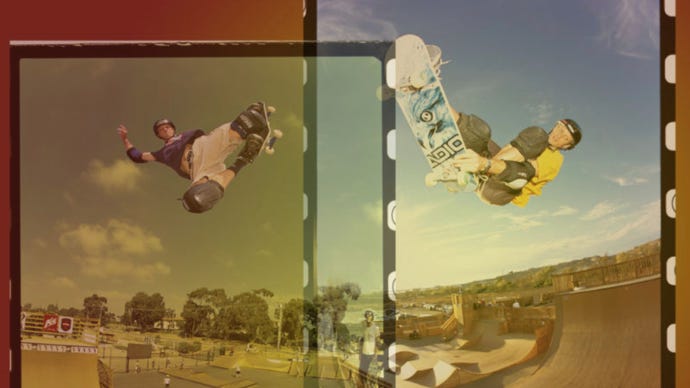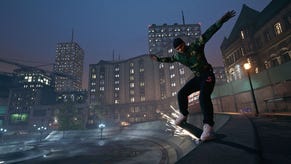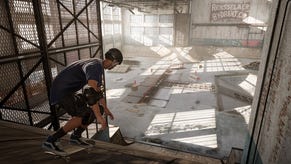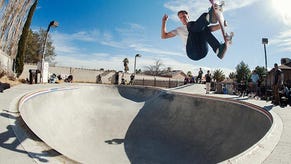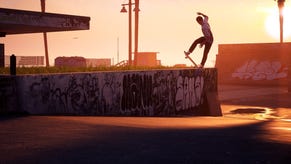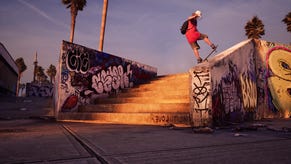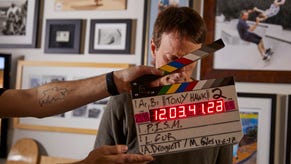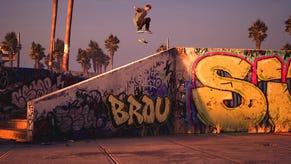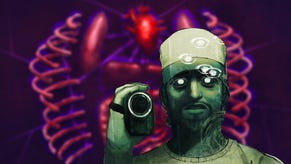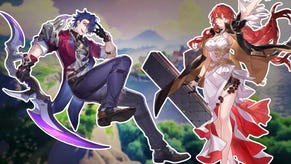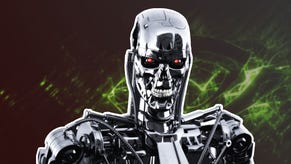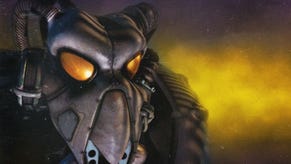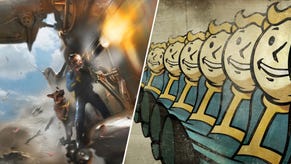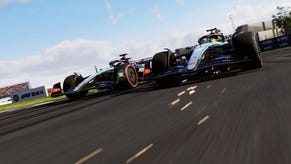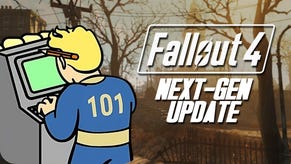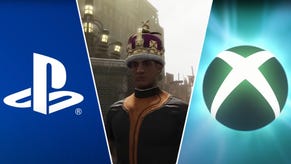Downhill Jam: The Game Industry Reflects on 20 Years of Tony Hawk's Pro Skater
Tony Hawk's Pro Skater turns 20 in September, so we spoke to people across the industry who remember the series fondly.
This article first appeared on USgamer, a partner publication of VG247. Some content, such as this article, has been migrated to VG247 for posterity after USgamer's closure - but it has not been edited or further vetted by the VG247 team.
Even the biggest video games rarely impact pop culture. The only recent ones that come to mind are Angry Birds, Minecraft, and Fortnite. Before those, though, there was Tony Hawk's Pro Skater.
Developed by a team of just 21 people at Neversoft Entertainment, Pro Skater left a crater in not only the game industry, but pop culture at large when it was released in 1999. Pro Skater, and its ensuing eight sequels, helped turn skateboarding from a niche hobbyist sport into a billion dollar industry. It helped make celebrities out of the titular Tony Hawk, and also Bam Margera, Andrew Reynolds, and Rodney Mullen. It got players into bands such as Goldfinger, Alkaline Trio, Bad Religion, and literally hundreds more. It got more kids than any other skateboarding piece of media ever to pick up a board, giving the action sport a go in their driveways or at local parks.
The Pro Skater series is now old enough that millions of people have grown up alongside it, either getting into skateboarding or the video game industry themselves. With the first game's 20th anniversary this year, we asked dozens of members of the game industry what the series means to them. From members of the press, to people working on triple-A games at studios with hundreds of employees, to developers making rivaling action sports games at the time, to small indie teams of only a couple of people, everyone has a story about Tony Hawk's Pro Skater.
Here they are.
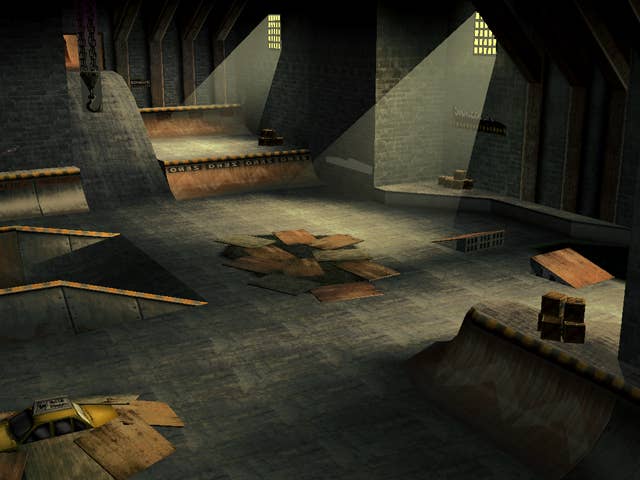
Kick Ass Like Tony
For people in the game industry—even the ones making competing action sports games—the Pro Skater games were a hit. They even helped some developers better believe in their projects. That is, once the game was able to secure a publisher.
Josh Tsui (former creative director at Robomodo, developer of Tony Hawk's Pro Skater HD): When I was at Midway, Tony [Hawk] and a programmer came to the San Diego studio to propose a skate game and got laughed out. He told me that the meeting was so bad that his programmer friend basically quit making games. That speaks to how nobody was even thinking about it back then, and speaks to Midway's culture.
Tin Guerrero (creative director at Z-Axis, developer of Dave Mirra: Freestyle BMX): We weren't nervous [when the game came out], rather we were encouraged that it seemed like there could be a market for a BMX video game too. [...]
From a game design perspective [Tony Hawk's Pro Skater] provided a first pass blueprint for what an extreme sports game could be. Since Mirra was already in development it helped validate a number of our independently-taken design decisions, challenged others, and also directly and indirectly sparked more unique and creative ideas.
The week that [Pro Skater] came out I was at the legendary action sports mecca Camp Woodward on a week long motion capture shoot with Dave Mirra and Ryan Nyquist, capturing the motions needed for the hundreds of tricks that went in Dave Mirra Freestyle BMX. After each 12-plus hour day of exhausting mocap, Dave and I retreated to his room and played [Pro Skater] for hours, passing the controller back and forth, collectively grinding through objectives to unlock each new level. We played the s**t out of the game all week and didn't sleep much. And throughout Dave just kept telling me his game needed to kick ass like Tony's. At one point he called Tony to tell him how good the game was—and to ask if he had any cheat codes.
Chris Charla (director, ID@Xbox): My first intro to the game was when I was at Next Generation magazine. We got a preview disc from Activision. Honestly, it was a licensed sports game so we were iffy on it because there had been a lot of really mediocre licensed sports games before, and really no super high-quality action sports games to that point. But the PR person really believed in the game, and she was like "You have to play it, it's amazing!" So I was like "OK, OK..." and I played it and yes, it was amazing! So we ran a preview immediately! This is right around when Tony did the 900 and I was honestly bummed we didn't give it more preview coverage.
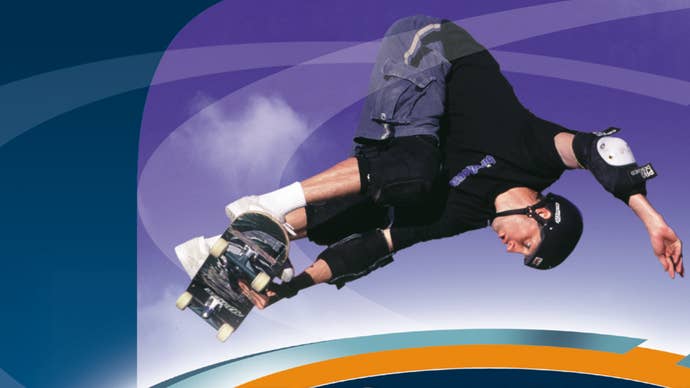
Growing up Hawk
Two decades ago, when Pro Skater launched on Sony's original PlayStation, Sega's Dreamcast, and the Nintendo 64, it captivated kids everywhere. For some, it was an introduction to skateboarding. For others, it was a window into what America was like.
Ryan Cash (founder and creative director at Snowman, developer of Alto's Adventure and Skate City): My first introduction to Tony Hawk's Pro Skater was at a friend's house, on his PlayStation. At the time I had already started skateboarding, and it was pretty much the greatest thing I'd ever experienced at the time. I didn't own a console myself back then, but I'd play it at my friend's house every chance I'd get. I was in love from the first moment I got my hands on it.
Danny O'Dwyer (founder of Noclip, a video game documentary channel): A friend of mine had a copy of [Tony Hawk's Pro Skater 2] he brought over to my house. We played split-screen graffiti tag, I think it was called. The music was great and they named all the tricks, and as a young kid learning skateboarding it just ticked a lot of boxes.
Megan Fox (independent developer, SkateBird): It was my first exposure to punk culture. It's weak sauce-very popular punk, but that was my in. Now I run around with purple hair and random colored flannels and ya know—I'm pretty punk. It stuck.
Blake Andrews (organizer of Babycastles, a New York-based indie arcade space and artist collective): I rented the first Pro Skater for N64 from Blockbuster. [...] I really enjoyed it. I rented 1-4 when they came out and got Underground for Christmas the year it came out. My family was fairly protective, so I wasn't allowed to skate more than outside of my driveway on my Podracing skateboard, so it was cool to be able to realize that specific fantasy of mine.
Frank Howley (video producer, community manager at Noclip): I was in the third grade. I had a small group of gamer friends and we'd always spend our recess sitting on the blacktop talking about games we've played and rumors we've heard. Jackson, the surfer/skater type in our group, shared his story of this new skateboarding game he got and bragged about how much fun he was having. Within that week, another friend in the group rented the game so I went to his house and tried it out. I remember playing the Chicago and School level, sitting cross legged on his carpeted room that was filled with Final Fantasy figures. This wasn't like other games on the Sony Playstation, it felt cooler. [...]
It was the fastest and coolest game to play, the punk and ska soundtrack also added to our Tony Hawk mania. We would be singing the songs at school and suddenly every dorky elementary kid (myself included) was interested in skateboarding.
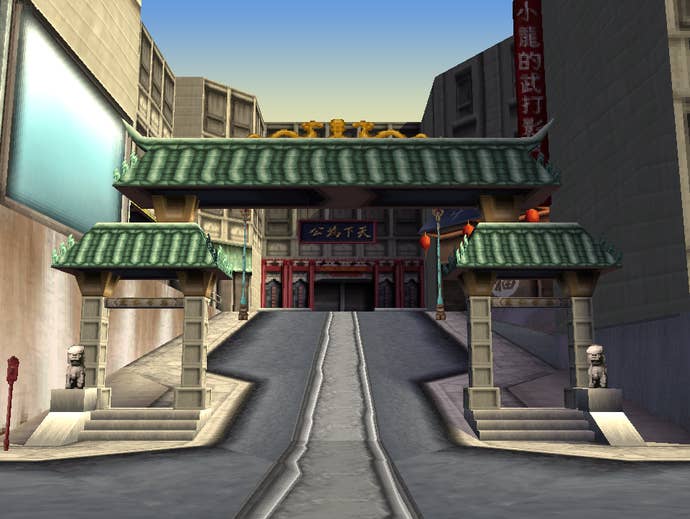
Authenticity
The Tony Hawk games tried to capture what it really meant to be a skateboarder, and the culture that surrounds the sport. Not in their gameplay—it's pretty hard to do a McTwist off the top of a hotel over a flying helicopter—but in their presentation. The Tony Hawk series prided itself on having real-life professional skateboarders, each voiced by the skater and with their own special tricks. It also had hand-curated soundtracks and real-world skate spots, such as the Brooklyn Banks in New York City and San Francisco's Embarcadero. Whether or not the games stuck the landing on this, people we talked to were mixed.
Chris Charla (director, ID@Xbox): Yes and no. In the '90s street skating had supplanted vert skating at the vanguard of where skating was going, but THPS obviously had a lot of vert and transition elements that really work great in games. So I was sitting in my house getting big air on a half-pipe in THPS while actual real street skaters like Cairo Foster were destroying the Clipper Hubba like a block away from my house in San Francisco!
Skating has always had a lot of cultures and scenes happening simultaneously, and I think for a video game it did do a tremendous job capturing a lot of elements of skate culture and introducing them to a larger audience! So, it might not have captured exactly the cutting edge of [San Francisco] street skating circa 1999, but it was fully authentic and you could feel that.
Ryan Cash (founder and creative director at Snowman, developer of Alto's Adventure and Skate City): As someone who was about 10 or 11 at the time, the game felt like it accurately captured skate culture. Sure we weren't grinding on telephone wires in the real world, but something about the whole thing just felt real to me at the time. It was exaggerated, for sure, but it felt real. It also felt like it captured every skater's imagination—that feeling you got as a kid when you were driving around in your parents' car, looking at all the terrain out the window that you could skate on.
Cameron Christian (design director at Insomniac Games, developer of Sunset Overdrive and Spider-Man): I think, yeah, it got all the feeling right, the name of the moves right. I just think the actions that they represented on the controller to the moves you actually did just [feel] more natural than any skating game I feel like I'd played up [until] that point.
Megan Fox (independent developer, SkateBird): It glamorized it, but more obviously, it gave a ton of people a window to pop-punk music. It's pretty much why we have the name/genre pop-punk.
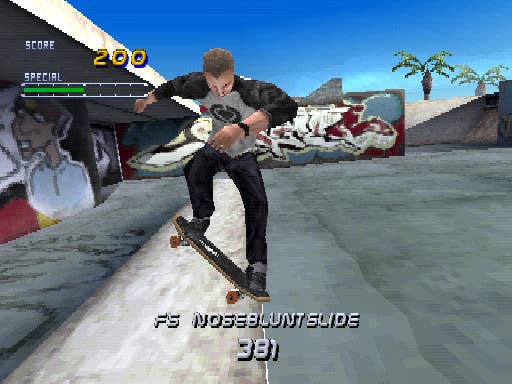
Steve Thorton (lead game designer at Sperasoft, contributing developer on Rainbow Six Siege, Assassin's Creed Odyssey): I am not and have never been cool enough to comment on what real skate culture is like, but I guess I saw Tony Hawk as a distilled splash of the skater spirit. It was like a moving album cover, larger than life.
Josh Tsui (former creative director at Robomodo, developer of Tony Hawk's Pro Skater HD): It brought [skateboarding] culture back to the mainstream! At that point skating was not nearly as popular as people think it was. I believe there was a real slump.
Daniel Lingen (director of social media, Twitch): At the time I was still in elementary school. We had a small group of skaters still considered to be an offshoot of normal culture at the time, it's safe to say we were outcasts. We loved THPS mostly because it offered us a venue outside of skate videos and actually skating, so yes, it's very safe to say that this game captured skating culture. [...]
As a person, I was able to find a community online that actually engaged with skateboarding in a way that was meaningful and impactful to us, we really did flee to the game in a time that was really tough for us, and we couldn't express our gratitude at the time because the game came out before YouTube or Twitch.
Blake Andrews (organizer, Babycastles): There were some skater kids at my high school and most of them were very into video games, so they frequently talked to me whenever they found a video game that they really liked. I have a clear memory of one of them being very enthusiastic and telling me that Tony Hawk's Underground "perfectly" captured skate culture. Maybe for him it did, but I very much wanted to figure that out for myself.
When I got more freedom when I was in my later teens when I started skating more, I think I realized that the Tony Hawk games were much more power fantasies than simulation. In the games, you play more as a professional or a savant skater doing really insane, unearthly tricks. It took me a very, very long time to do my first ollie on a real skateboard. Maybe the first few games were very accurate to an experience, but I am not a professional skater, so it is very hard to gauge that.
There is an aspect of practicing combos over and over that feels accurate. But doing the most simple tricks on a real skateboard is much harder [than it is] in the game. I don't hold this at fault or anything, I'm not sure it would be as fun.
The first few games I don't think represented the skate scene as well, or what it really felt to be a skater at that time. The story in Underground, while very exaggerated, feels much more realistic now. I remember really loving that you could run around rather than just be attached to your skateboard. There were a lot of characters and some of the social quality of skating translated very well. Also, the aspect of chasing fame feels specifically accurate to a type of person that skates.
Why It Stuck
Two decades after Tony Hawk's Pro Skater's release, the game, and the ensuing series, still are a staple of the video game industry—even if the last few titles had a drastic dip in quality. Still, in 2019, games such as the first Pro Skater, Pro Skater 3, and Tony Hawk's Underground are considered some of the best games ever made. Despite their age, they're games that have stood the test of time.
Tin Guerrero (creative director at Z-Axis, developer of Dave Mirra: Freestyle BMX): It had an impact because it founded a genre. Not many games can claim that. Sure, action sports games had been around before (I loved California Games and 720 [Degrees], among others), but Hawk was the right game at the right time.
And from a cynical game developer standpoint, for better or worse, the Tony Hawk series steered Activision into their 21st century business model. It convinced consumers they need to buy a new Guitar Hero, Skylanders, Call of Duty, or whatever every single year.
Danny O'Dwyer (founder, NoClip): I think it taught us a lot about how to burn out an audience. The sheer number of games that Activision released, and how similar they were, basically killed the arcade skate game. It was great when Skate came along and made a more sim-based version of the sport. They also nailed the modern skate culture in a way that the [Pro Skater] franchise really never did.
Chris Charla (director, ID@Xbox): To me it was a really foundational game that showed just how important second-to-second feel is in games. At that time there were a lot of games that just felt really bad, even if the graphics were great, and I think after [Pro Skater] making sure the game felt right and that the metrics felt good became more important, to everyone's benefit. It was one of the first games to just explode from out of nowhere, which we saw later with Grand Theft Auto 3, and then Minecraft, and PlayerUnknown's Battlegrounds, and Fortnite. So it just became this phenomenon that everyone in the game industry paid an incredible amount of attention to. But I definitely think the craft of game-feel is the place where it's had the most lasting impact, and Neversoft probably doesn't get enough credit for that. Tony worked with them a lot on the early games, and it shows in the feel.
Steve Thorton (lead game designer at Sperasoft, contributing developer on Rainbow Six Siege, Assassin's Creed Odyssey): Much like Guitar Hero and the instrument peripheral wave, Tony Hawk carved out an all new genre space. It wasn't just a game, it was a cultural touchstone, and it landed right in the formative years of a generation that would go on to define the culture and discourse of video games for the next decade as its next wave of developers, journalists, and veteran players.
Ryan Cash (founder and creative director at Snowman, developer of Alto's Adventure and Skate City): [Tony Hawk's Pro Skater] is still incredibly fun. I think the whole graphics/realism race is over now, and people are a lot more concerned about games that are fun. Old school consoles are also making a big comeback (similar to vinyl), and I think it's just got a certain genuine factor that you don't see often in games today.
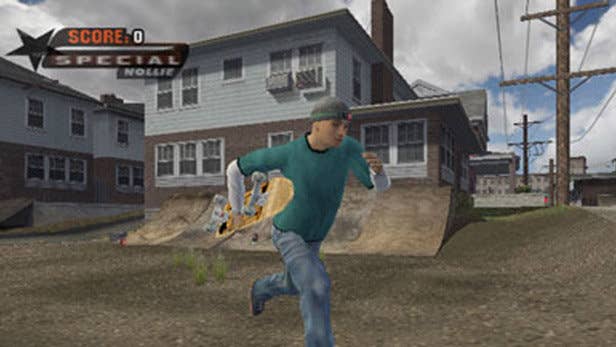
Changing Lives
Every single person we spoke to has a story about how the Tony Hawk series changed their lives. From people who wouldn't be in the video game industry without it, to people who cite it as a major influence in their own games, to people who were able to ride the success of the action sports genre, the ripple effect of Tony Hawk's Pro Skater is still felt throughout the industry today.
Cameron Christian (design director at Insomniac Games, developer of Sunset Overdrive and Spider-Man): You're never that fluid unless you're, like, a super-pro and even then you're not that fluid. To be able to do that in a game and really exaggerate that fluidity and how awesome you could feel doing it was definitely a big impact on how I thought about movement in games, really, just outside of even skating. [...]
For me, it was a giant influence [while making Sunset Overdrive]. I really was trying to look at creating a movement system that had the flow and feeling and input cadence of a Tony Hawk kind of mixed with Prince of Persia, with the wall-running and bouncing off things and swinging and stuff like that. So yeah, definitely had a big influence on that.
Ryan Cash (founder and creative director at Snowman, developer of Alto's Adventure and Skate City): Even though I left the world of video games in many ways (as a player) for a long time, I accidentally found myself back in the industry. Tony Hawk's Pro Skater had a huge influence on the first real video game we ever made, Alto's Adventure. So much so that we picked up a used PS2 during development and a few of the old games to play for research.
Danny O'Dwyer (founder, NoClip): Skateboarding culture only permeated Ireland [Editor's Note: where O'Dwyer is from] through a handful of magazines that were available. So, getting to learn about famous skate spots like Venice, [Embarcadero] and Marseille was pretty cool. [...] It helped me figure out who I wanted to be a bit. I wonder if it sold the California lifestyle so well to me that it was part of the reason I moved to California later in life.
Tin Guerrero (creative director at Z-Axis, developer of Dave Mirra: Freestyle BMX): Here's how it affected my career. At Z-Axis from 1999-2002 we made a skateboarding game, a freestyle motocross game, an aggressive inline game, the Mirra BMX series, and the infamous BMX XXX. We rode the action sports wave. Mirra fended off Activision's BMX attempt (Mat Hoffman Pro BMX) and others to become the #1 selling BMX video game series and the #2 series in the entire action sports genre, behind Hawk of course. Then in 2002, Activision acquired Z-Axis, perhaps thinking if you can't beat them, make them join you.
Blake Andrews (organizer, Babycastles): I have made two very large projects based on the Tony Hawk games. One is called Daytonite, and the other is Tony Hawk's Pro Scrapeboard.
Daytonite was my thesis project when I was a Master's student at the NYU Game Center. You play as a dog/person who is permanently attached to a ripstik and is largely based on growing up in Dayton, Ohio. A lot of the game is based on what feels like an inaccurate representation of what it feels like to be a skater in the Tony Hawk games and is maybe the anti-Pro Skater, the opposite of a power fantasy.
I made this game into a large installation where you have to play it in the center of about 13 TV monitors all playing the game at once. You control the game with a Guitar Hero controller and are encouraged to jam out and look like a rock star or whatever. This game is one of the primary reasons I am involved with Babycastles today. Though the final version is unreleased, I have shown different versions of this game at different art and game events and galleries in New York.
With Babycastles I collaborated to make the other game Scrapeboard, [...] but is directly influenced by Tony Hawk himself and he simultaneously officially and unofficially is present in the game. This game was mainly an alt-controller take on Tony Hawk: Ride, but super simplified mechanically. It's taken me to many different festivals across the East Coast. The craziest one was that I showed it in a storefront window at a Puma shoe re-release in the past month.
Steve Thorton (lead game designer at Sperasoft, contributing developer on Rainbow Six Siege, Assassin's Creed Odyssey): I recall spending hours in the Park Editor, choreographing increasingly long and impossible grinds to try and exploit for high scores. The latter half of my playtime in the game was spent in my custom parks, tweaking and stretching the placement of stunts to the max, fighting with the heat bar. [...] Never occurred to me, but Tony Hawk's Park Editor was probably my first experience fitting together modular kits, and my first experience working around technical limits.
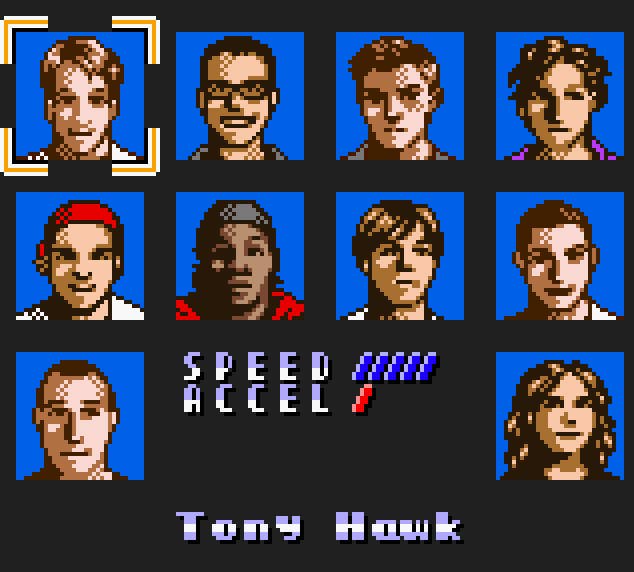
Chris Charla (director, ID@Xbox): Probably the biggest impact on my career was just getting to write a lot of articles about it and the sequels. Interviewing Tony Hawk at the YMCA skatepark in Carlsbad [California] was an amazing experience. We had skate photographer Grant Britain do the photos, and he did an awesome job. (I really regret that we lost the photos when the magazine folded.) There was a fun pic we printed in the mag of Tony doing a 540 over our heads at the top of the ramp as we pretended to try to ask questions, holding a notebook and a pen.
That day, though, just the whole day in San Diego of hanging at 7-11 before the interview and being at the park, and meeting Tony and having a really in-depth conversation with him was just really special to me because it was a taste of the skateboard world, which was a world I'd seen from the outside, but never been a part of. Tony was super honest too, just saying how prior to THPS he felt his pro-skating career was really over, and he was trying to figure out what was next for him career-wise. And then the 900 and THPS kick-started his career and the whole industry, and it hasn't slowed down since. That interview is definitely one of my career highlights, honestly.
Daniel Lingen (director of social media, Twitch): The major [Pro Skater] series installments had a credit video that was the developers trying to skate... and I wanted to be one. I watched those videos regularly and fantasized about being a part of the team. After the GBA release they had a [callout for jobs] and I applied. I wasn't even remotely qualified, but that was the first moment I realized I could become a part of the industry. After Skate was released, [...] I was given my opportunity to join the games industry and I'm proud to say that I've had a very successful 13-year career now that I attribute to that in the [Pro Skater] credits. Full stop, if it wasn't for the GBA credits, I would not be working in video games.
